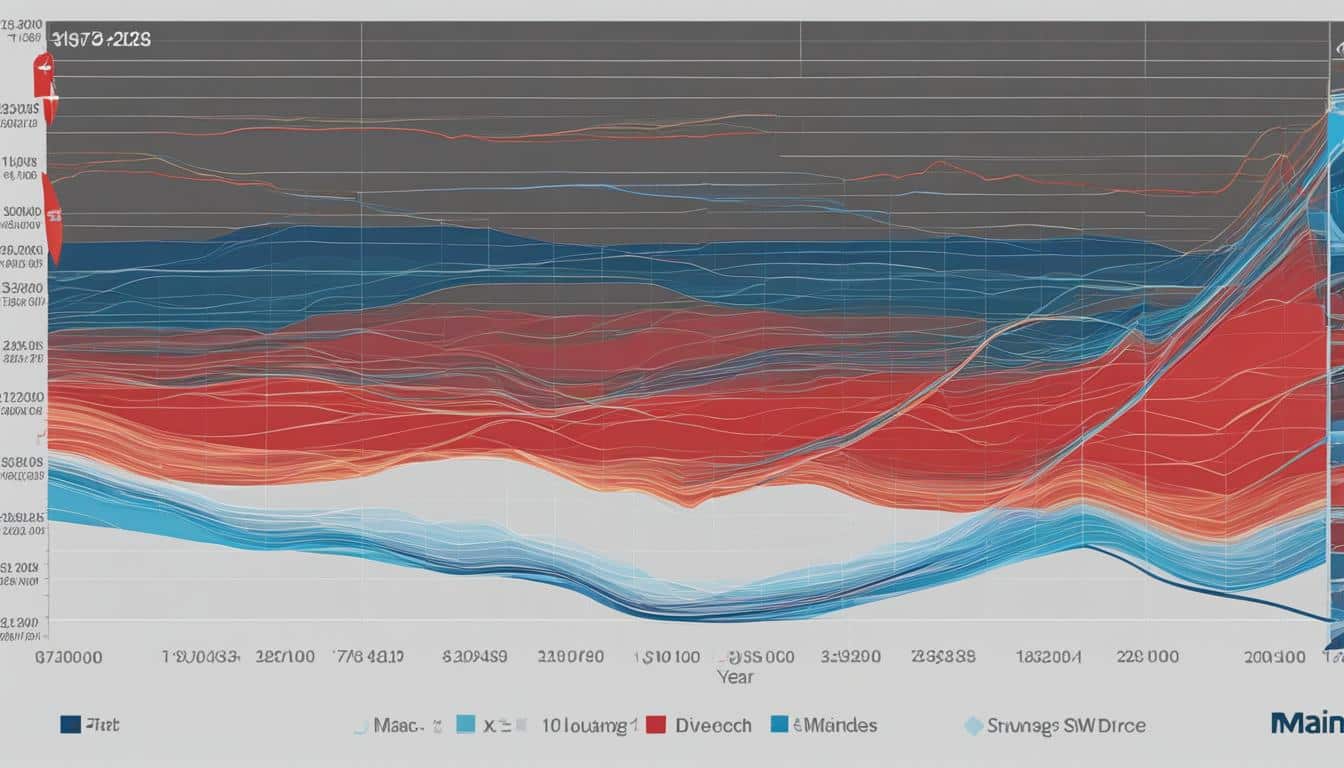Physical Address
304 North Cardinal St.
Dorchester Center, MA 02124
Physical Address
304 North Cardinal St.
Dorchester Center, MA 02124

Are you facing the prospect of divorce in Maine and wondering about the timeline? You’re not alone. Many are curious about how long they’ll need to navigate this life-changing process.
In Maine, the duration of a divorce can vary significantly. It hinges on factors like mutual agreements, complexity of assets, and even court schedules.

This article delves into what you can expect from start to finish. We’ll guide you through the key phases of a Maine divorce, from the initial filing to the final court decision.
Stay with us to discover crucial insights and tips for managing your journey through the divorce process in Maine.
For more on how long divorce takes and the factors that impact it, check out our article, How Long Does a Divorce Take.
In Maine, there is a minimum waiting period of 60 days after the defendant has been served with the divorce paperwork before a judge can schedule a final divorce hearing. This waiting period allows both parties time to work through the divorce process and reach a settlement. It is important to note that this waiting period is a legal requirement and cannot be waived, even if both spouses are in agreement about the divorce.
During this waiting period, it is common for spouses to engage in negotiations and discussions to address various aspects of the divorce, such as property division, child custody, and alimony. This time can be used to gather necessary documentation, consult with attorneys, and explore options for resolving conflicts. The waiting period provides a buffer to ensure that both parties have sufficient time to consider their options before finalizing the divorce.
It’s important to understand that the waiting period does not necessarily mean that the divorce process will take exactly 60 days. The overall timeline can vary depending on the complexity of the case, the cooperation of both parties, and any potential Maine court backlogs. However, the waiting period sets a minimum timeframe before a final divorce hearing can be scheduled.
If you’d like to find out about the costs involved in a Maine divorce, check out our article How Much Does a Divorce Cost in Maine.
| Divorce Process | Waiting Period |
|---|---|
| Minimum Waiting Period | 60 days after the defendant is served with the divorce papers |
| Duration of Waiting Period | The waiting period allows time for negotiations, discussions, and preparation for the divorce process |
| Factors Affecting Timeline | Complexity of the case, cooperation of both parties, and potential court backlogs can impact the overall timeline |
When it comes to getting a divorce in Maine, the length of the process can vary depending on the type of divorce you choose. Understanding the different divorce types and their timelines can help you navigate through the process more effectively.
1. Uncontested Divorce: An uncontested divorce occurs when both parties agree on all divorce-related matters, including child custody, property division, and financial support. This type of divorce generally takes less time to finalize, often within the minimum 60-day waiting period after the defendant has been served with the paperwork.
2. Contested Divorce: A contested divorce happens when spouses don’t agree on certain aspects of the divorce, such as child custody or division of assets. This can significantly lengthen the divorce process as it may require court intervention and potentially even a trial. The timeline for a contested divorce can vary depending on the complexity of the case and how long it takes to reach a resolution.
| Divorce Type | Timeline |
|---|---|
| Uncontested Divorce | Within the minimum 60-day waiting period |
| Contested Divorce | Varies depending on the complexity and resolution |
It’s important to note that these timelines are general guidelines and can vary depending on individual circumstances and the backlog of cases in the court system. If you’re unsure about which type of divorce is right for you or need assistance navigating the process, consulting with a divorce attorney can provide you with the guidance and support you need.

When it comes to the divorce process in Maine, several factors can significantly impact the timeline. Understanding these factors is crucial for anyone going through a divorce, as they can have a significant effect on how long the process takes.
One factor that can impact the speed of the divorce process is the complexity of the case. If there are numerous assets to divide, disputes over child custody, or disagreements regarding alimony, the process is likely to take longer. Complex cases often require more time for negotiation, mediation, and potentially even a trial.
The willingness of both parties to collaborate and reach a settlement can also impact the timeline of a divorce. If both spouses are open to working together and are willing to compromise on certain issues, the process can move more swiftly. However, if there is a high level of conflict and a lack of collaboration, the divorce process may be protracted.
The availability of the court and the backlog of cases can also play a role in the timeline of a divorce in Maine. If the court is experiencing a high volume of cases or has limited availability for hearings, it can lead to delays in the process. It’s important to consider the current court schedule and plan accordingly to minimize any potential delays.
By considering these factors and working with experienced legal professionals, individuals can navigate the divorce process in Maine more effectively and potentially reduce the time it takes to reach a resolution.

If you’re going through a divorce in Maine and want to expedite the process, there are several steps you can take to help speed things up. By being proactive and organized, you can minimize delays and reach a resolution more quickly.
One of the first things you can do to speed up the divorce process is to gather all the necessary documents and information related to your case. This includes financial records, property documents, Maine divorce forms, and any relevant paperwork pertaining to child custody or support.
By having everything prepared and organized, you can streamline the process and prevent unnecessary delays.
Another way to speed up the divorce process is to work with a mediator or divorce attorney. These professionals can help facilitate negotiations and guide you through the legal requirements. They can also assist in finding common ground between you and your spouse, which can lead to a quicker resolution. By having an advocate on your side, you can navigate the complexities of divorce more efficiently.
Lastly, being willing to compromise on certain issues can greatly expedite the divorce process. By approaching negotiations with an open mind and a willingness to find a middle ground, you can avoid unnecessary conflicts and reach a resolution more quickly. Remember that compromises may be necessary to expedite the process and move forward with your life.
Get an overview of the filing process in How to File for Divorce in Maine.
Divorces involving children can often take longer to finalize due to the additional considerations of child custody, visitation rights, and child support. In Maine, the best interests of the child are the primary factor considered when making decisions regarding child custody. Parents are encouraged to work together and consider the needs of the children in order to reach a fair and amicable agreement.
Child custody in Maine is divided into two types: legal custody and physical custody. Legal custody refers to the right to make important decisions about the child’s upbringing, such as education, healthcare, and religion. Physical custody, on the other hand, determines where the child will primarily reside.
In situations where parents are able to communicate and cooperate effectively, joint custody arrangements may be considered. This means that both parents share legal and physical custody of the child. However, if the court determines that joint custody is not in the best interests of the child, they may award sole custody to one parent, with the other parent being granted visitation rights.
| Type of Custody | Description |
|---|---|
| Legal Custody | The right to make important decisions about the child’s upbringing, such as education, healthcare, and religion. |
| Physical Custody | Determines where the child will primarily reside. |
| Joint Custody | Both parents share legal and physical custody of the child. |
| Sole Custody | One parent is granted legal and physical custody of the child, while the other parent is granted visitation rights. |
In summary, although the length of a divorce in Maine can vary, understanding the process and taking proactive steps can help you navigate through it more smoothly. By focusing on the best interests of all parties involved and seeking appropriate legal assistance when needed, you can work towards a more timely conclusion to your divorce.
To see how the timeline of divorce in Maine compares to how long it takes in other states, check out our articles about how long a divorce takes in New Hampshire and the divorce timeline in West Virginia.